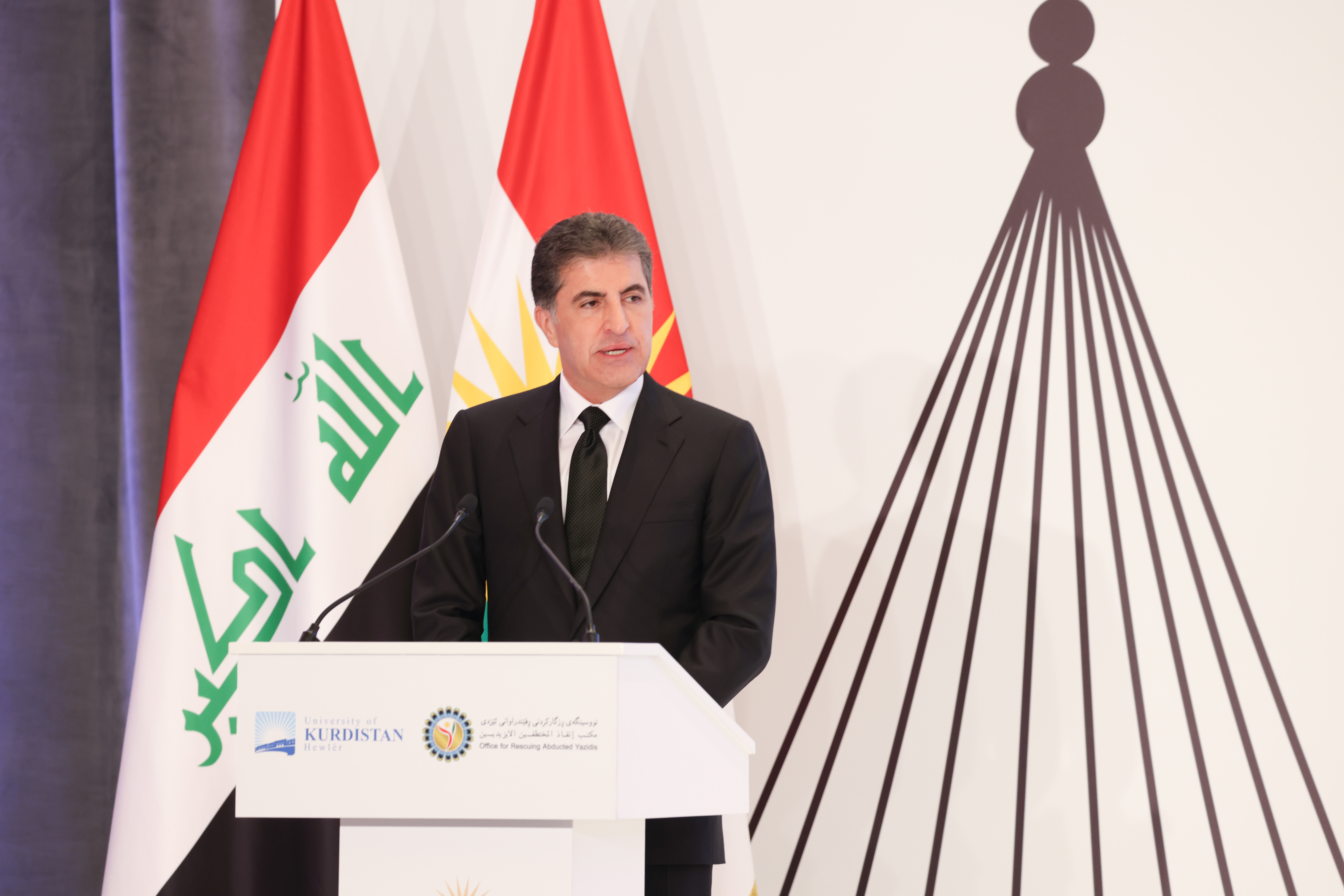
2024-08-03T10:15:24.000000Z
Erbil, Kurdistan Region, August 3, 2024
President Nechirvan Barzani participated today in the 10th Commemoration of the Yazidi Genocide which was arranged by the University of Kurdistan-Hewler and the Office for Rescuing the Abducted Yazidis in Erbil. The ceremony was attended by the representative of the Iraqi President, the representative of the Kurdistan Region Prime Minister, KRG Deputy Prime Minister Qubad Talabani, the Mir of the Yazidis, the Baba Sheikh, the Head of the Kurdistan Region Judicial Council and a number of officials from Iraq and the Kurdistan Region, along with many diplomats and Yazidi representatives.
President Nechirvan Barzani delivered the following speech at the ceremony:
Your Excellency, Mir of the Yazidis, Mir Hazim Tahseen Beg,
Your Excellency, Baba Sheikh,
Dear Yazidi brothers and sisters,
Dear Attendees,
Good morning,
The 10th anniversary of the tragic Yazidi Genocide is a solemn occasion for us to reflect on one of the most heinous atrocities in modern history. Even a decade later, the wounds remain raw, and our Yazidi community continues to endure the deep and lasting impact of this horrific event. The memory of this appalling crime stands alongside other atrocities, such as chemical attacks, the Anfal campaign, forced deportation, mass graves, and the widespread destruction inflicted upon the people and the land of Kurdistan.
Over 5,000 individuals were brutally murdered and buried in nearly 100 mass graves. More than 6,417 Yazidi females, minors, and young children were abducted and subjected to trafficking. Tragically, the whereabouts of 2,596 of these individuals remain unknown. The devastation wrought upon Sinjar and its neighbouring areas, along with the forced migration of hundreds of thousands from Sinjar and its vicinity, ensures that the immense suffering of all those affected will persist indefinitely ̶̶ not just for a decade, but for eternity.
The genocide of the Yazidis, in our time, was an unspeakable tragedy that deeply shook the very foundations of humanity across the world. This devastating event marked a pivotal juncture in the history of Kurdistan and Iraq, underscoring the urgent need for heightened vigilance and collaboration within the international community to prevent such atrocities from occurring in the future. It is imperative that all possible measures are taken to hold the perpetrators accountable, deliver justice for the victims, and provide comprehensive reparations to those affected.
On this solemn day, we honor the sacrifices made by the Yazidi community with the highest reverence. We pay tribute to their sacred spirits, who will forever hold a cherished place in the hearts of every Kurdistani and compassionate individual. Our thoughts are with the families of the fallen, and we stand in unwavering solidarity with them in their profound grief. We deeply understand their enduring yearning, their lamentation, and the sadness that echoes incessantly in their lives. Together, we share in their pain and remain steadfast by their side.
Ladies and gentlemen,
Recovering from the aftermath of genocide, rebuilding daily routines, and nurturing a renewed sense of hope within the Yazidi community amidst their complex circumstances presents a formidable challenge. However, their resilience and determination to survive ̶ reflected in the Yazidi’s historical ability to withstand multiple genocidal attempts ̶ will empower them to rise again and forge a new beginning.
International efforts to acknowledge the genocide of the Yazidis, along with global aid as well as initiatives taken in the Kurdistan Region and Iraq to support the Yazidi displaced, are commendable. These efforts include enacting legislation for Yazidi survivors and other affected communities, such as Christians, Turkmen, and Shabak, providing monthly financial assistance from both the Iraqi federal government and the Kurdistan Regional Government, and supporting Yazidi refugees in their return to Sinjar. However, it is clear that these actions alone are insufficient, and much more needs to be done to fully address the needs of the Yazidi community.
Mitigating the impact of genocide is a shared responsibility for the people of Iraq, the Kurdistan Region, and the global community. Addressing the psychological, social, human, economic, and environmental aftermath of genocide is a challenging, ongoing endeavour that requires exceptional proficiency, expertise, and a sense of urgency. There is no alternative but to persist and triumph in this undertaking.
It is imperative to uncover the fate of those who remain missing and to offer relief to their families, who continue to endure the anguish of prolonged uncertainty. I hereby assure the Yazidi community that our office will tirelessly persist in its efforts to rescue all abducted Yazidis until none remain in captivity.
A significant number of individuals require extended psychological support and specialized care to facilitate their reintegration into everyday life. The region of Sinjar and its vicinity necessitate reconstruction efforts, the provision of essential services, and the establishment of peace and stability. Consequently, it is imperative for the Iraqi Federal Government to collaborate with the Kurdistan Regional Government in executing the agreement aimed at normalizing conditions in Sinjar.
The welfare of the Sinjar population and the Yazidi community must be our foremost priority. It is imperative that we work together to ensure that the residents of Sinjar and the Yazidis are no longer subjected to the detrimental effects of political agendas and are not held captive by external regional influences. The autonomy of the Sinjar people in managing their own affairs should be restored, freeing them from the control of foreign powers.
Therefore, it is imperative for the PKK and other unauthorized entities to vacate Sinjar to facilitate the restoration of security, livelihoods, economic growth, and renewed optimism in the region. In a diverse Iraq, home to various religious and ethnic groups, functional institutions and adherence to the constitution are crucial for safeguarding the rights of all communities, both now and in the future. This commitment to constitutional governance serves as the cornerstone for peace, stability, and progress in our nation, requiring collective efforts toward its implementation.
Dear Attendees
Yazidism embodies principles of life, humanity, and mutual acceptance. It does not conflict with any other religious or belief systems. The Yazidi community values happiness and peaceful coexistence with their environment, fostering a society that prioritizes peace and stability. Their loyalty and compassion extend to their nation, fellow citizens, and neighbors. Consequently, the Yazidis serve as a vital pillar of a diverse culture characterized by pluralism, coexistence, and tolerance within both Kurdistan and Iraqi society.
By perpetrating genocide against the Yazidis, ISIS sought to sow discord, disunity, and strife among the various societal groups as well as dismantle our culture of peaceful cohabitation. Regrettably, in Sinjar and other areas, the Yazidis awoke one fateful morning to find their longtime neighbors donning black attire, aligning themselves with ISIS, and launching violent attacks against the Yazidi community. This reality is undeniably a source of profound anguish.
As we reflect on a decade marked by genocide and hardship, the Yazidi community must prioritize the restoration of trust above all else. It is incumbent upon each and every one of us to take all essential measures to provide the Yazidis with safety, reassurance, and optimism for a brighter more promising tomorrow. Together, let us devise a strategy that transforms their past experiences into a catalyst for indefinite protection, ensuring that they never have to endure such a tragic chapter again.
Our universities have a crucial role to play alongside the government, political parties, and other stakeholders in serving the Yazidis. It is imperative that academic institutions prioritize scientific research and academic theses in various languages to explore the ways in which the Yazidi community has safeguarded their religion, culture, traditions, and language.
I urge our academic institutions to allocate a portion of their graduate and postgraduate research projects to the study of the Yazidi community, encompassing all aspects of their existence. This initiative will help empower the Yazidis to share their narratives and advocate for their rights while simultaneously preserving their cultural identity and legacy, ultimately establishing a robust, factual, and credible body of knowledge in global discourse.
In conclusion, we honor the valiant Peshmergas who lost their lives during the mission to free Sinjar, guided by the leadership of President Masoud Barzani. May their souls rest in peace. Our heartfelt condolences go out to their esteemed families.
The defeat of ISIS in Iraq and the Kurdistan Region was made possible by the support of the international coalition. By working together, we can confront and dismantle the dangerous ideologies of terrorism, extremism, and violence. It is imperative that we maintain our collaborative efforts to address the ongoing threat posed by ISIS to the peace and stability of Iraq and the wider region.
I express my gratitude to the University of Kurdistan-Hawler and the Office for Rescuing Abducted Yazidis for their tireless work in coordinating this commemorative event. I would also like to extend my appreciation to the officials and staff of our office for their relentless efforts in rescuing the abducted individuals. The successful rescue and repatriation of 3,579 abductees is a remarkable achievement that deserves our deepest recognition and praise. I extend my best wishes for their continued success.
To the Yazidi community, I pledge our unwavering commitment to support and protect your rights. Our dedication to transforming Sinjar into a province and rebuilding it remains resolute. We are steadfast in our mission to uphold the political and administrative inclusion of the Yazidis and other groups within the governmental structures of both the Kurdistan Region and Iraq. Furthermore, we will persist in our efforts to raise awareness and seek reparations for the genocide inflicted upon the Yazidi people.
I extend my heartfelt regards to all those observing this sombre anniversary today, no matter where you are. I wish to express my gratitude to everyone who have supported the Yazidi community and the residents of Sinjar since the onset of the genocide. I especially acknowledge the steadfast and welcoming people of Duhok and the broader Badinan region, who embraced the victims of Sinjar with open arms. Their compassion and bravery will remain etched in our memories.
May the memory and spirit of the Iraqi Air Force General Majid Abdul Salam Al-Tamimi be blessed, as he tragically lost his life while bravely assisting the victims of Sinjar. We convey our salutations to his spirit and offer our admiration and affection to his relatives.
Once again, welcome everyone.
Thank you.
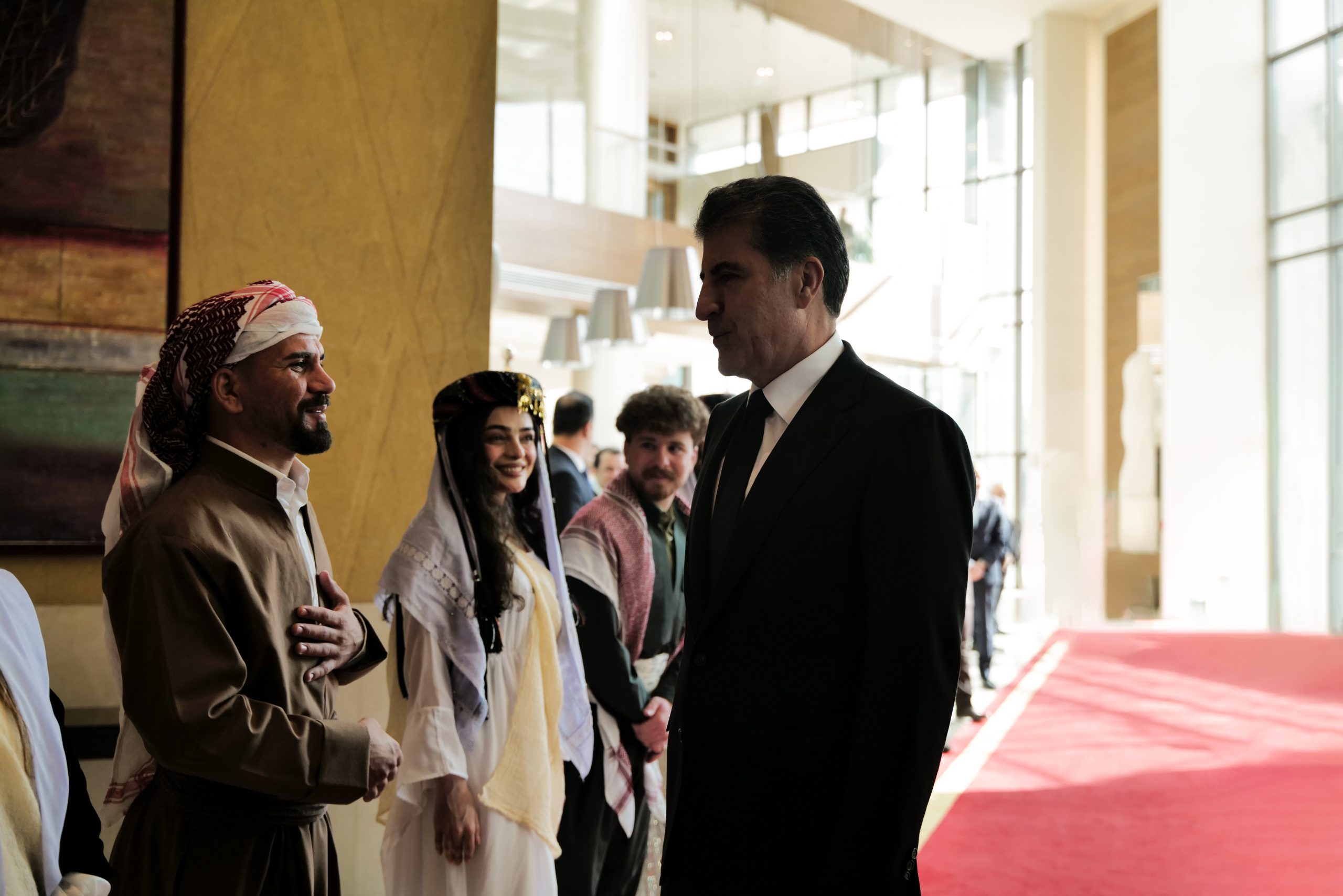
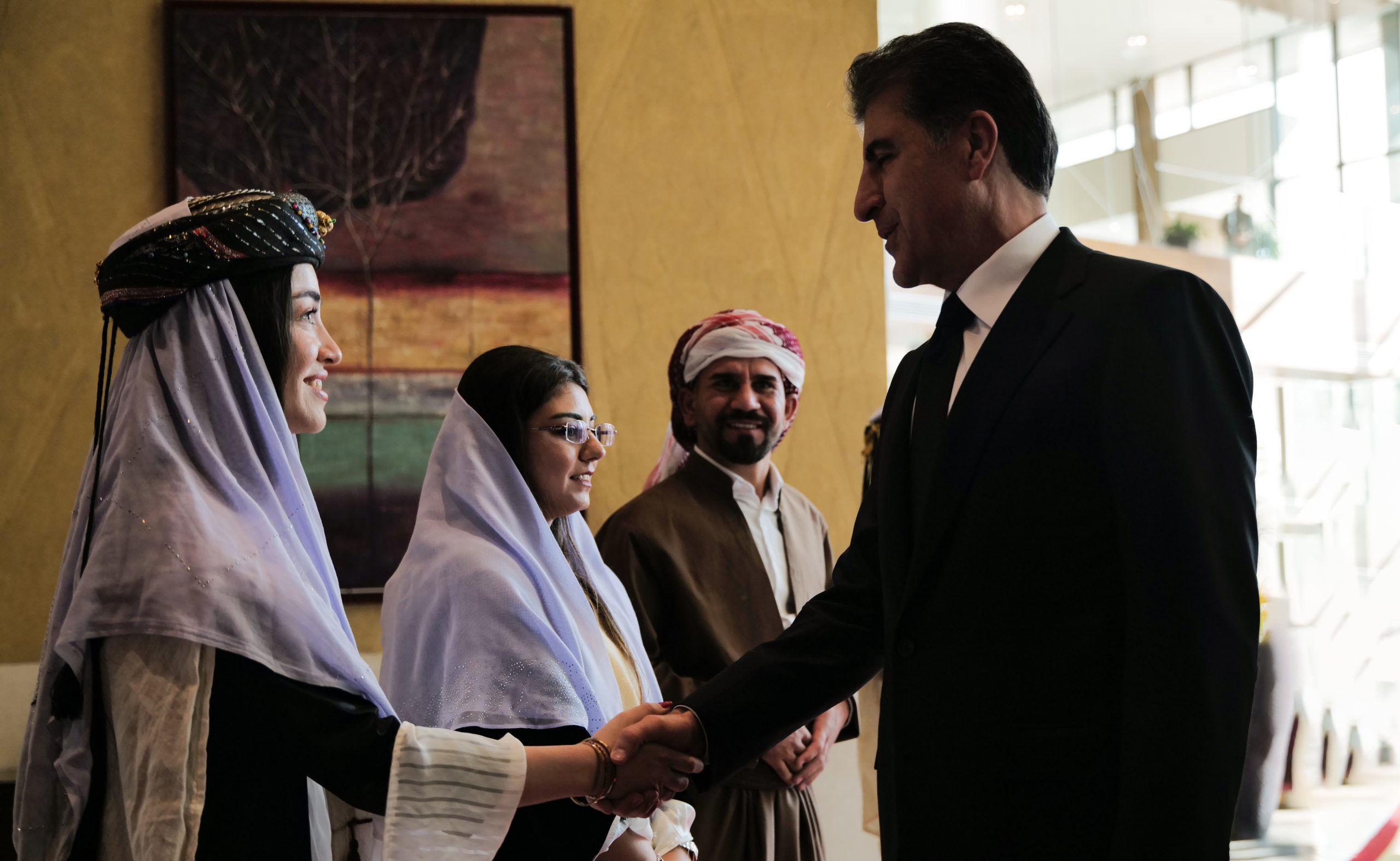
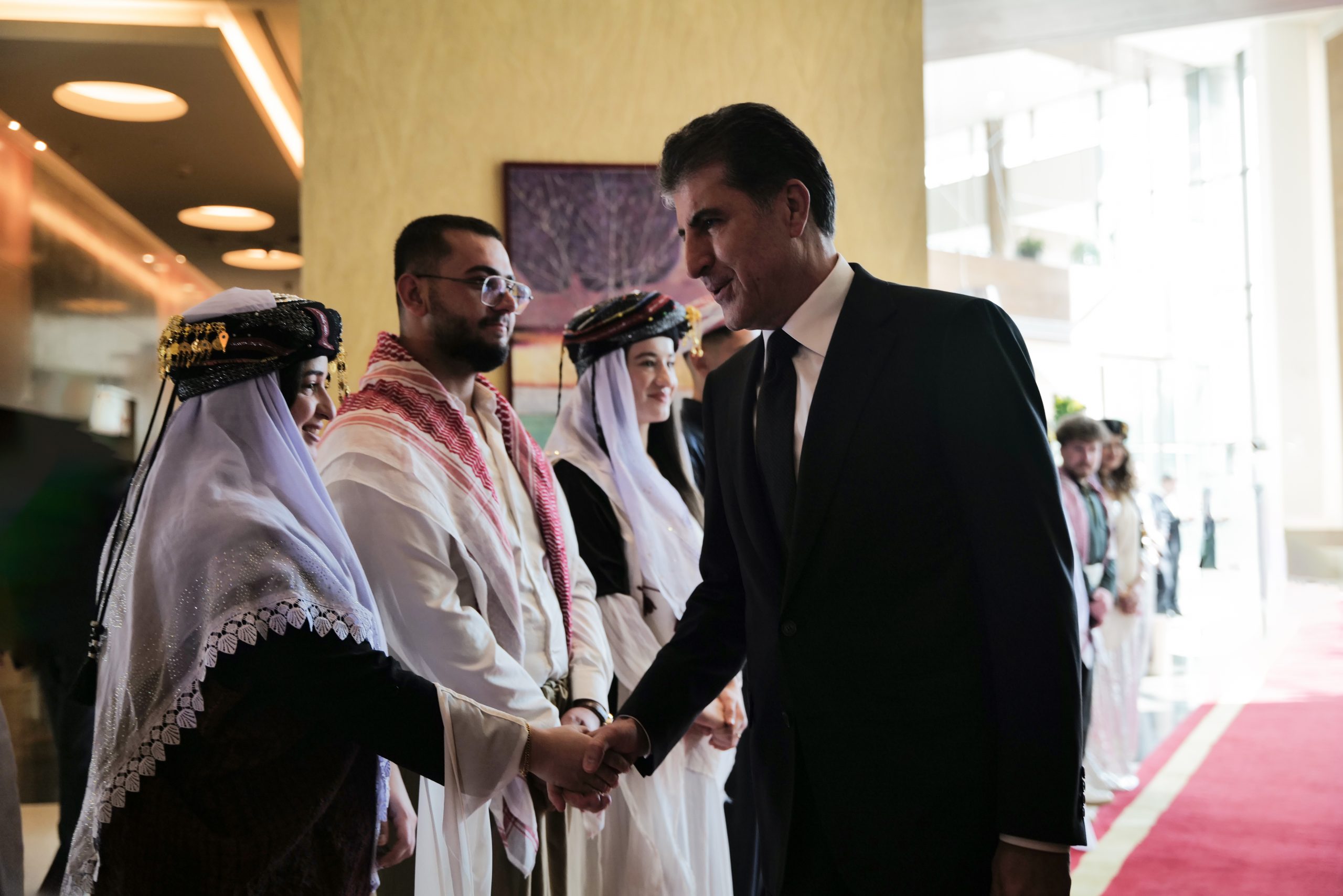
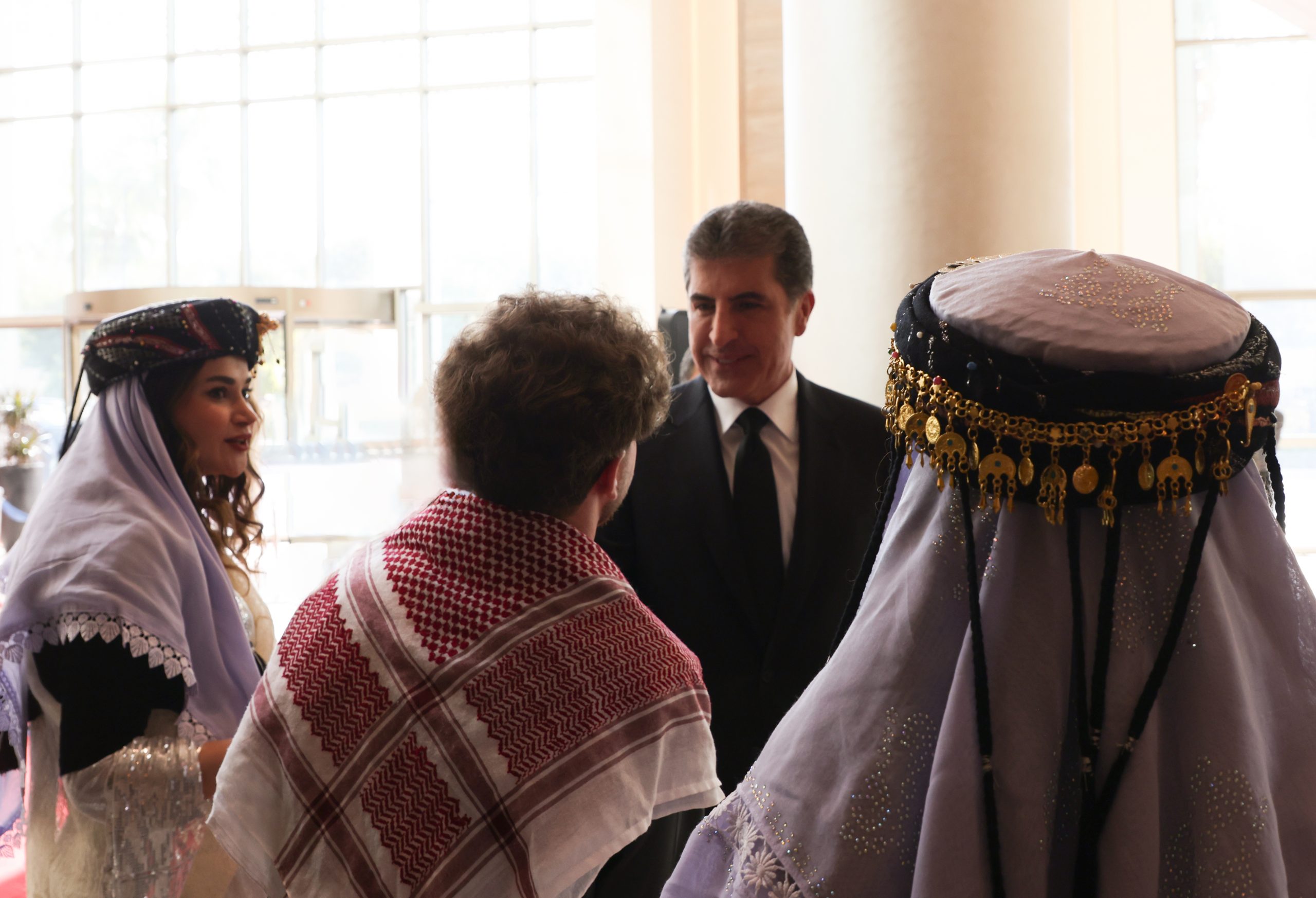
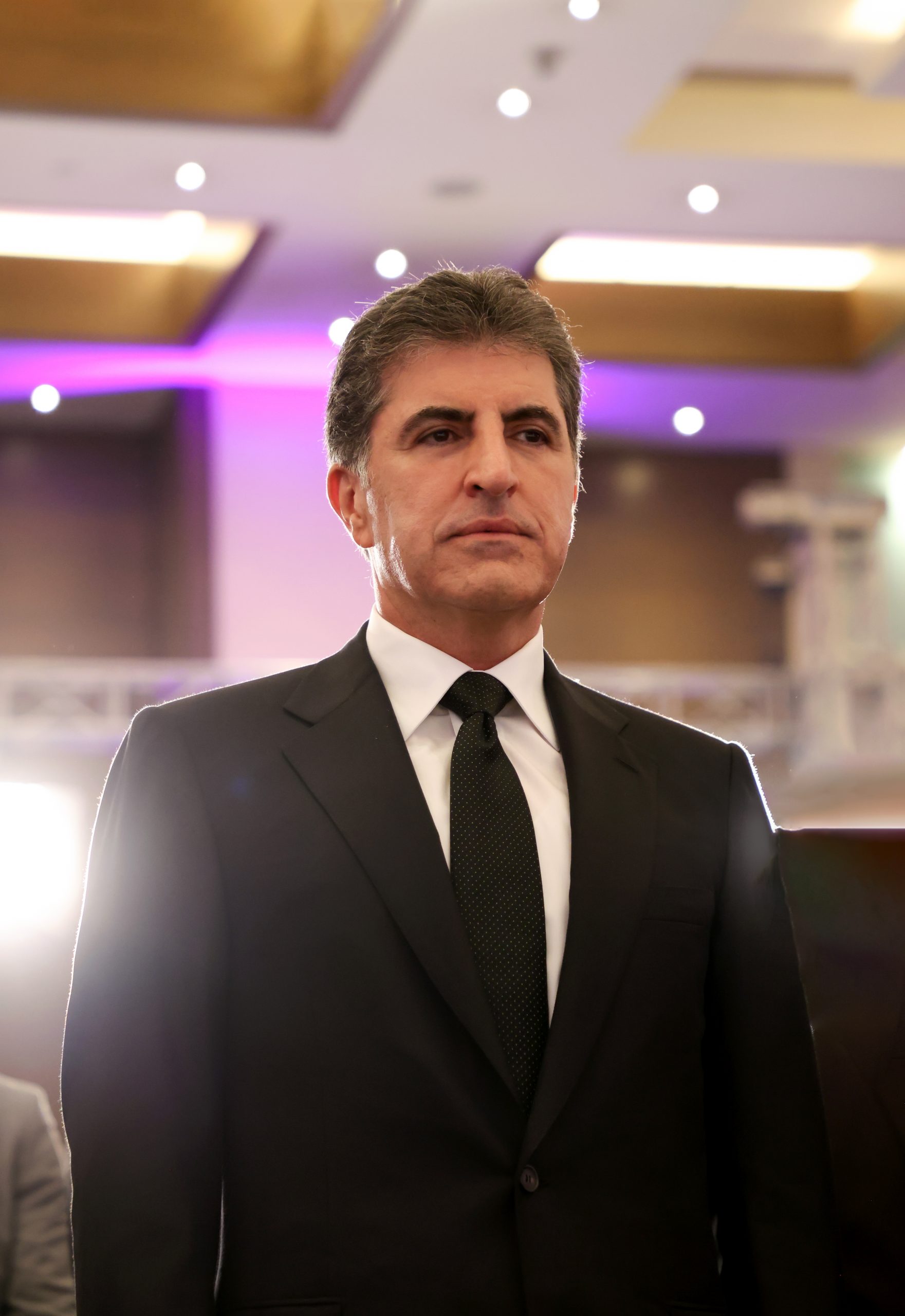
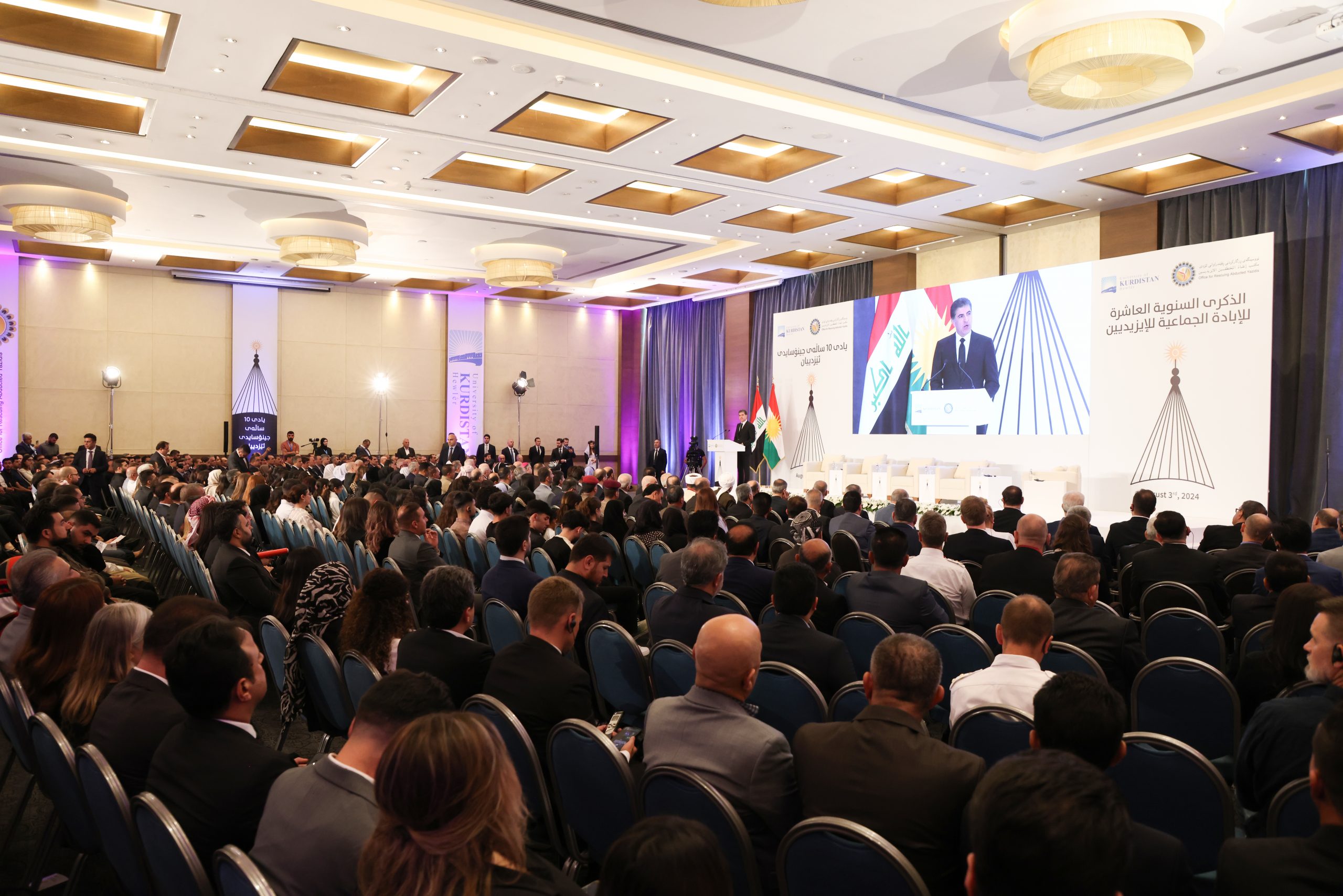
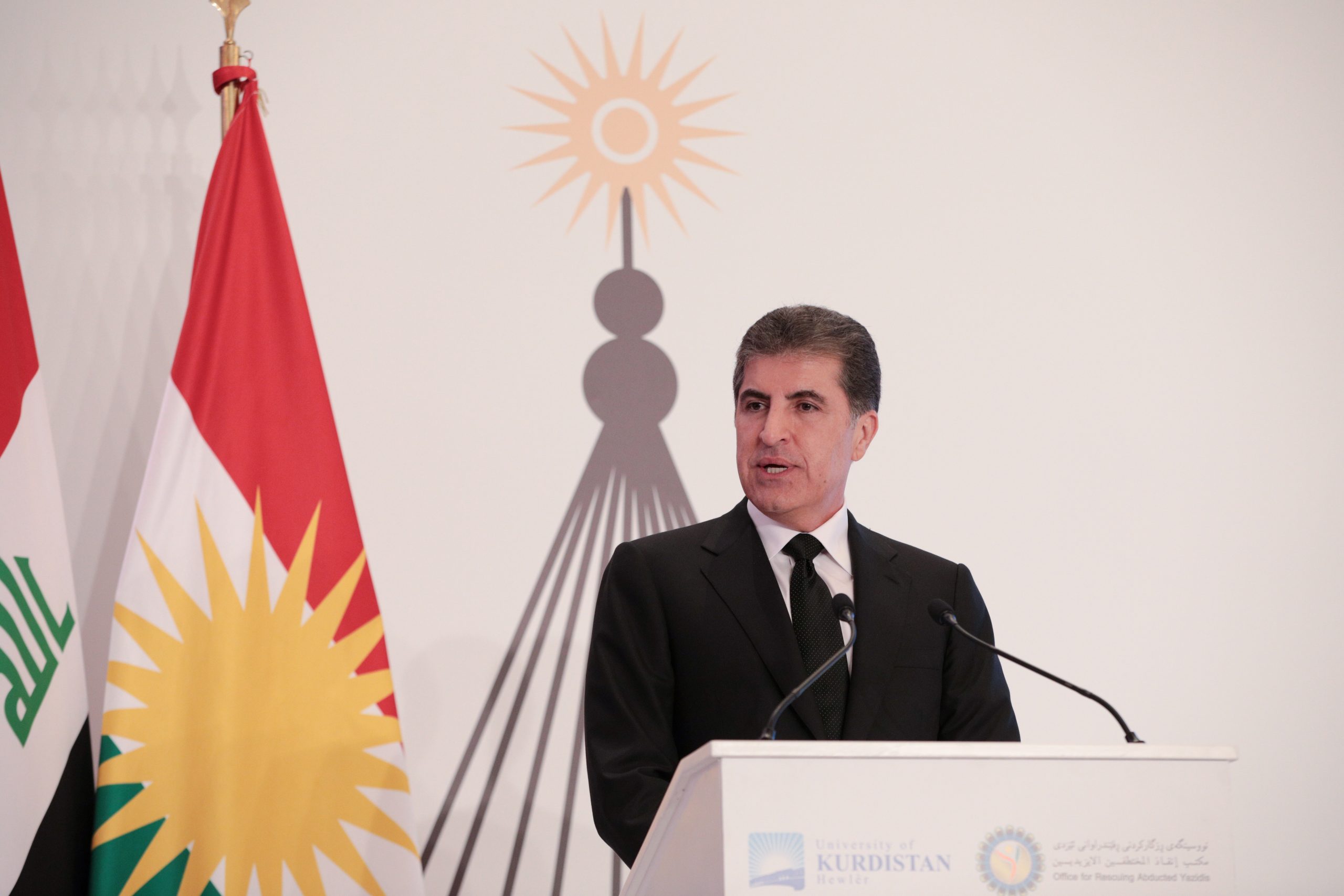
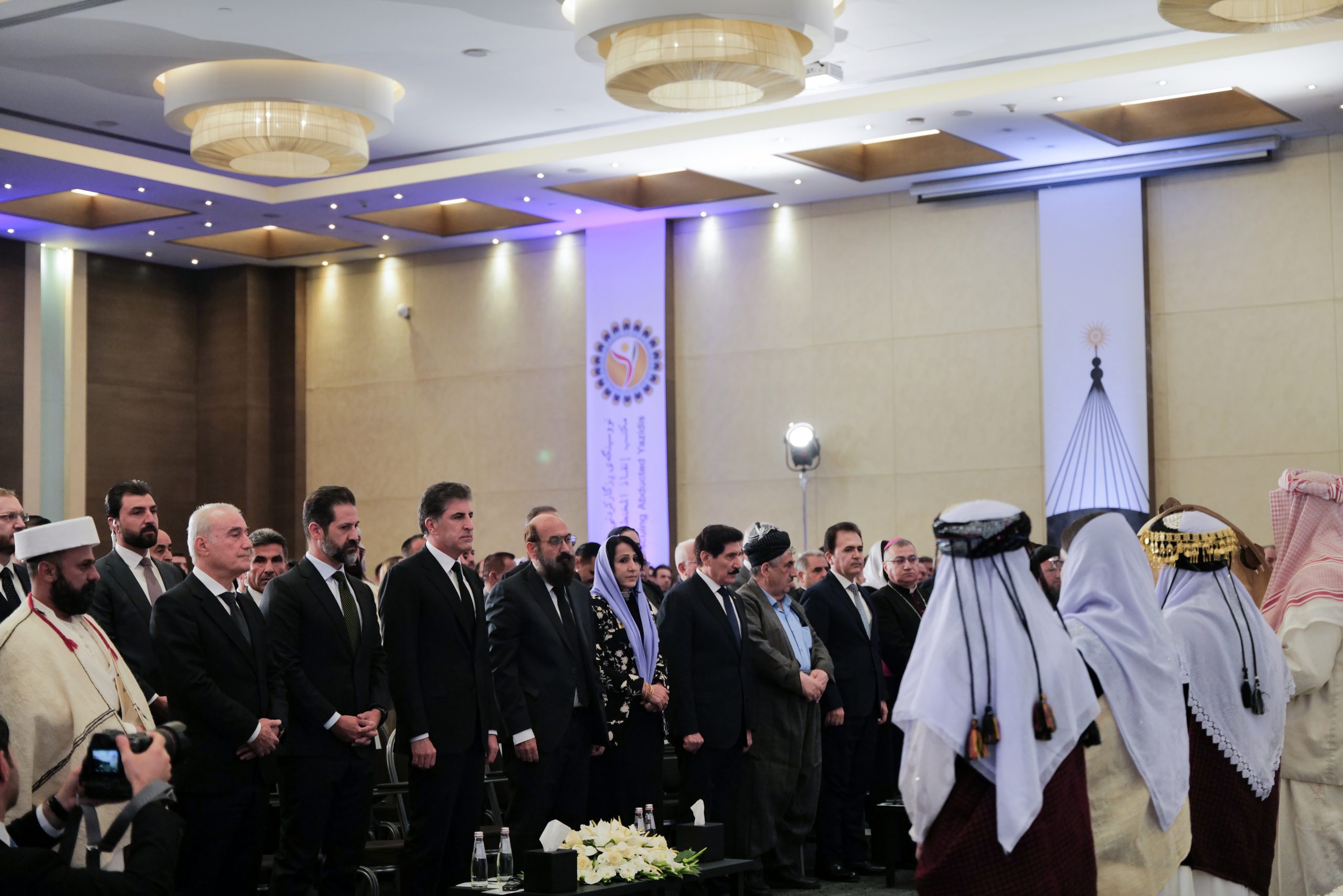
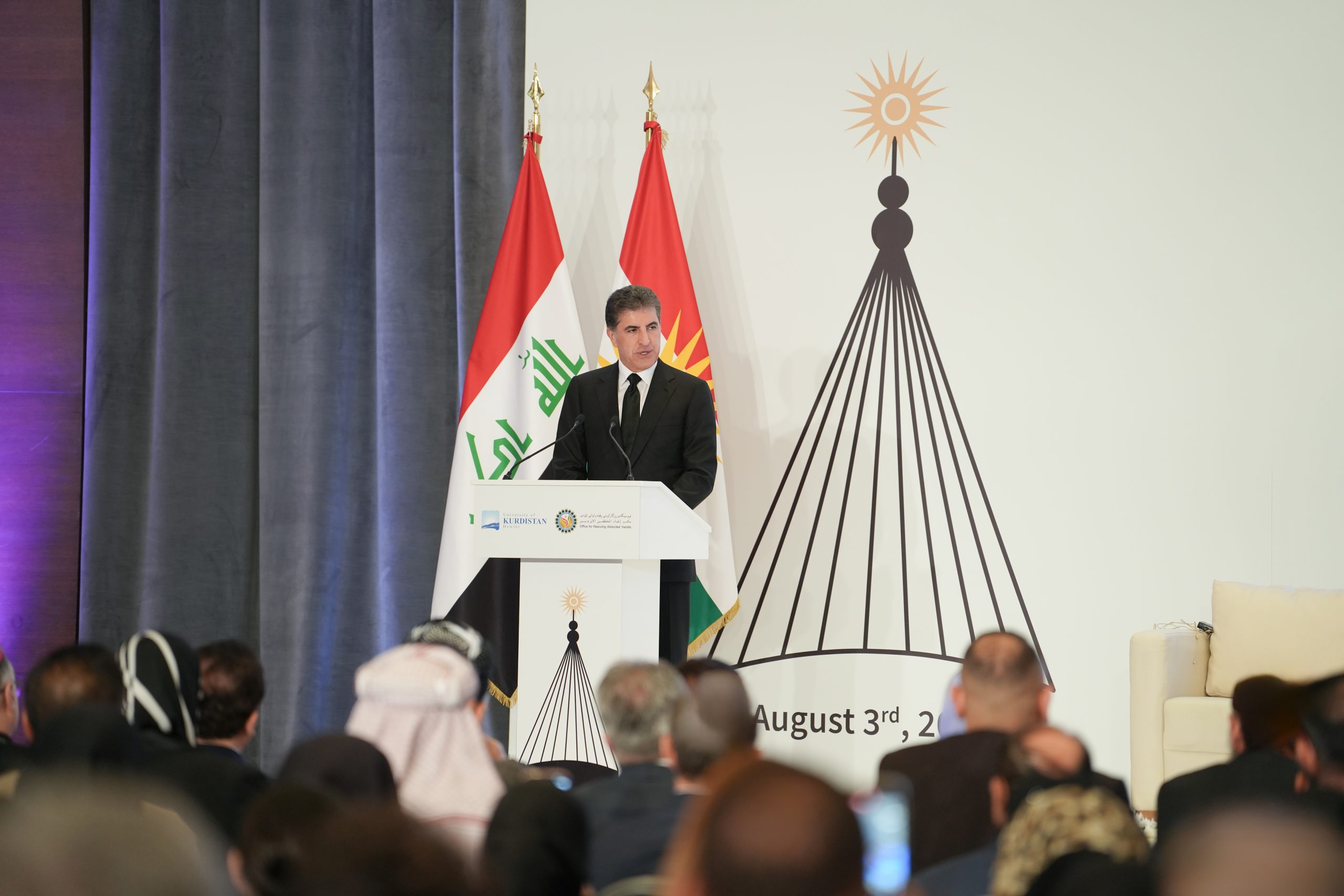
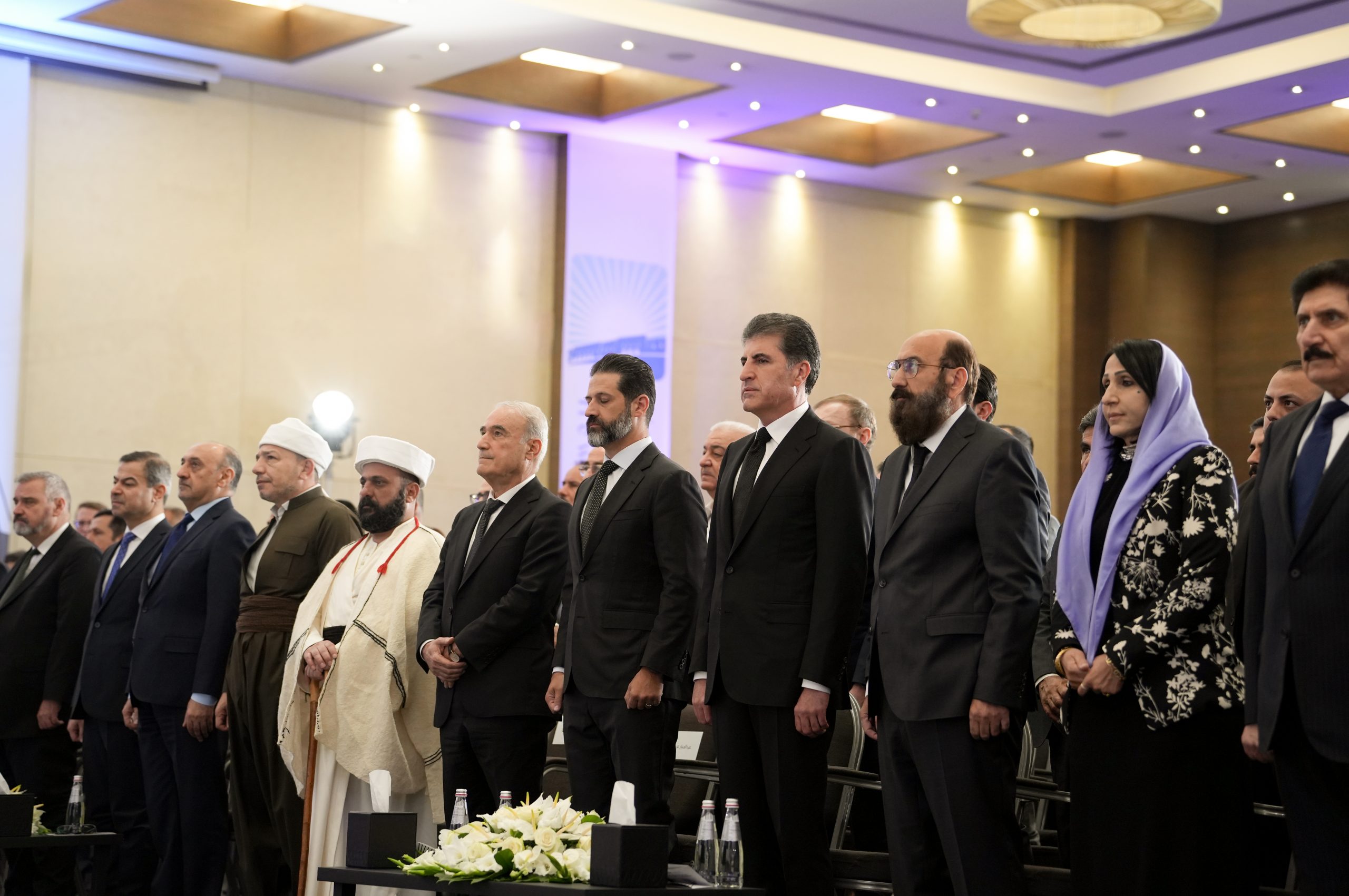
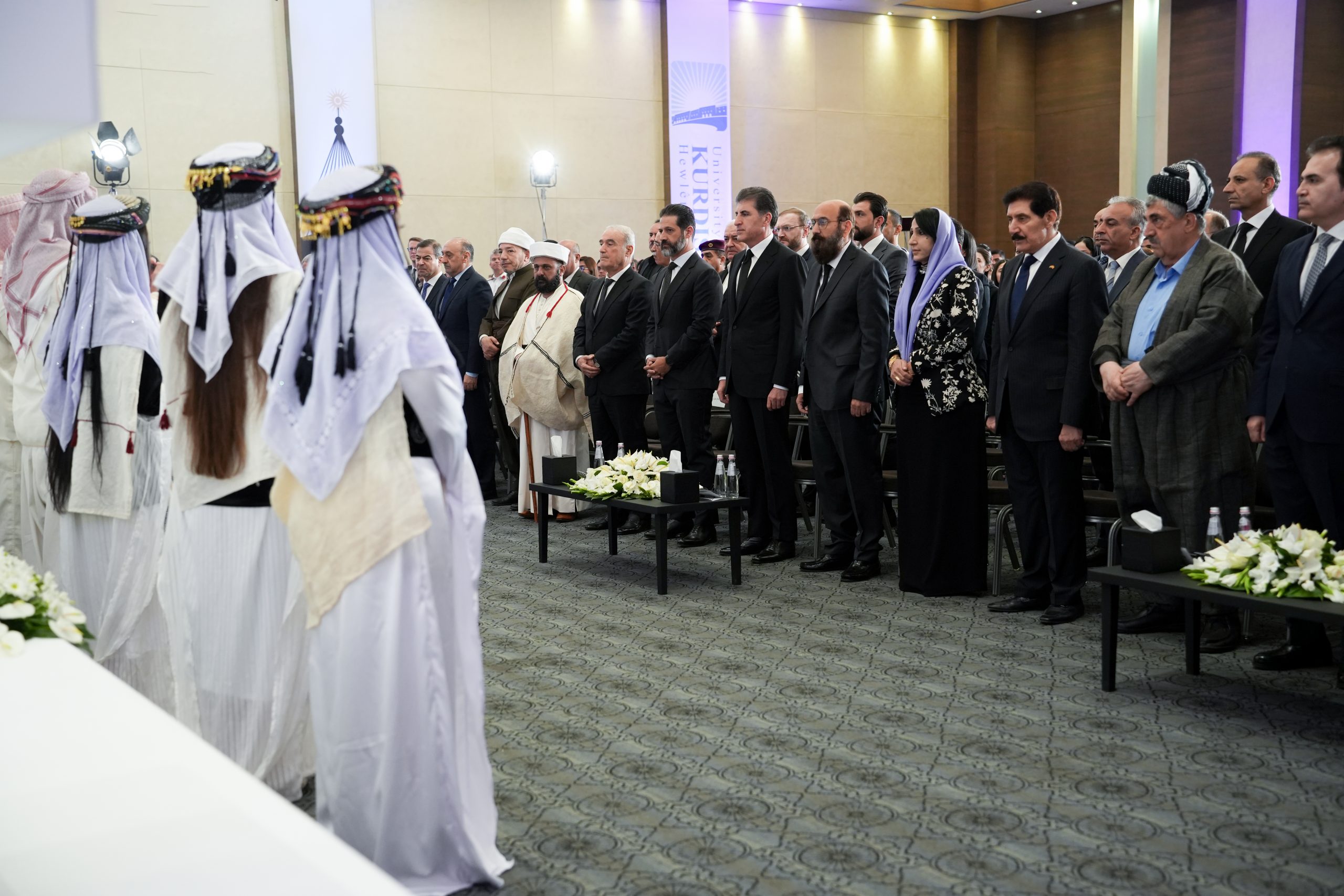

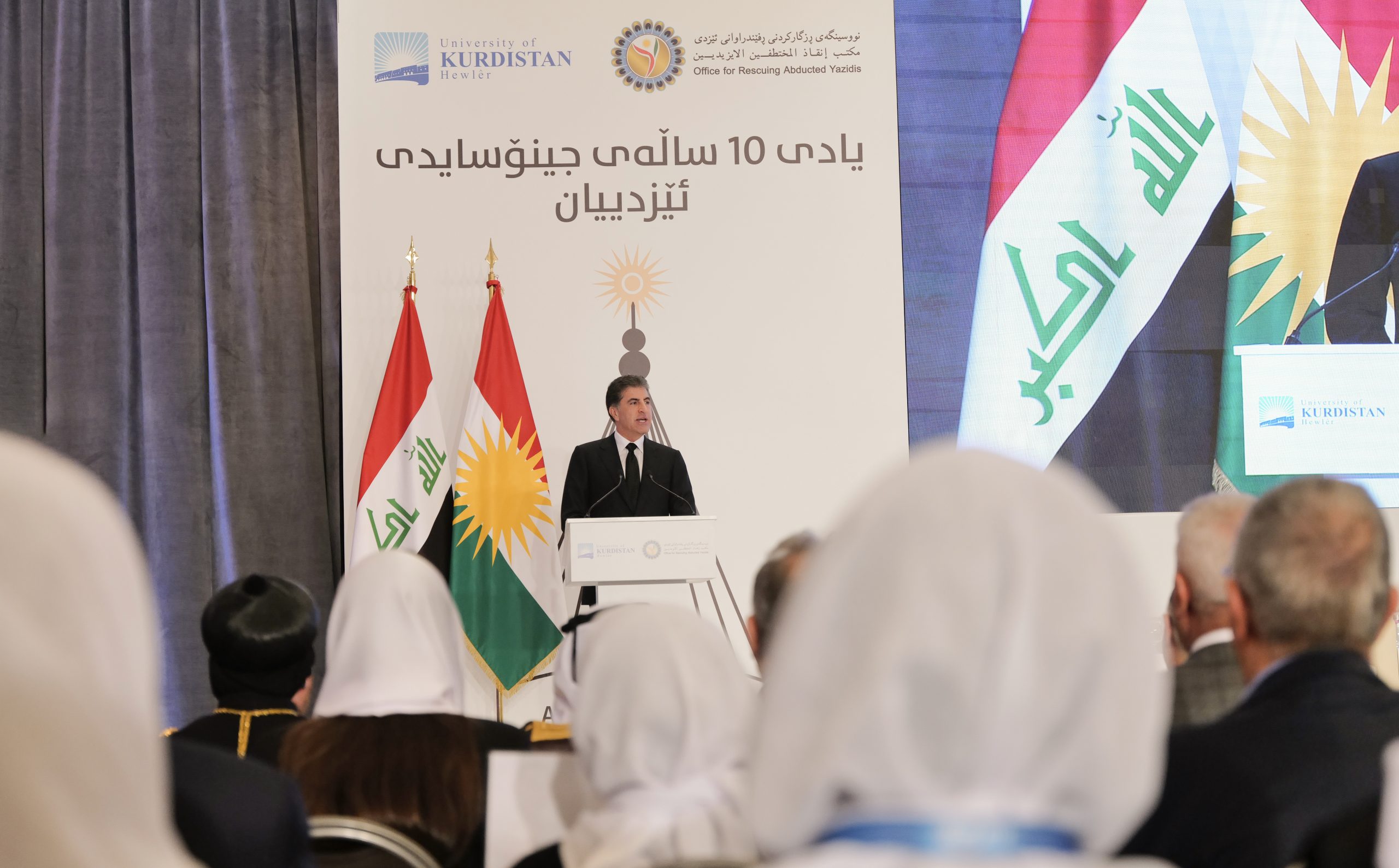
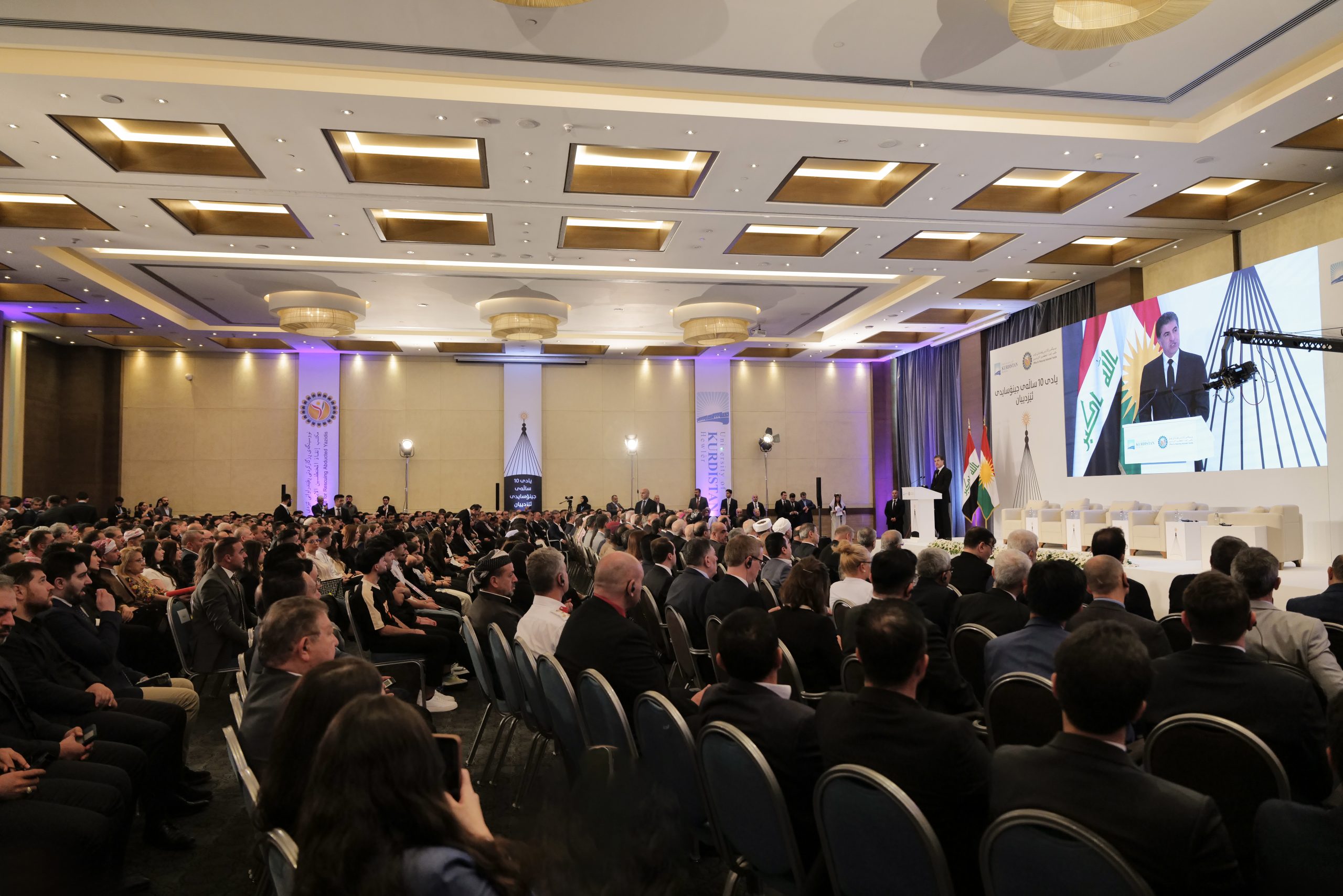
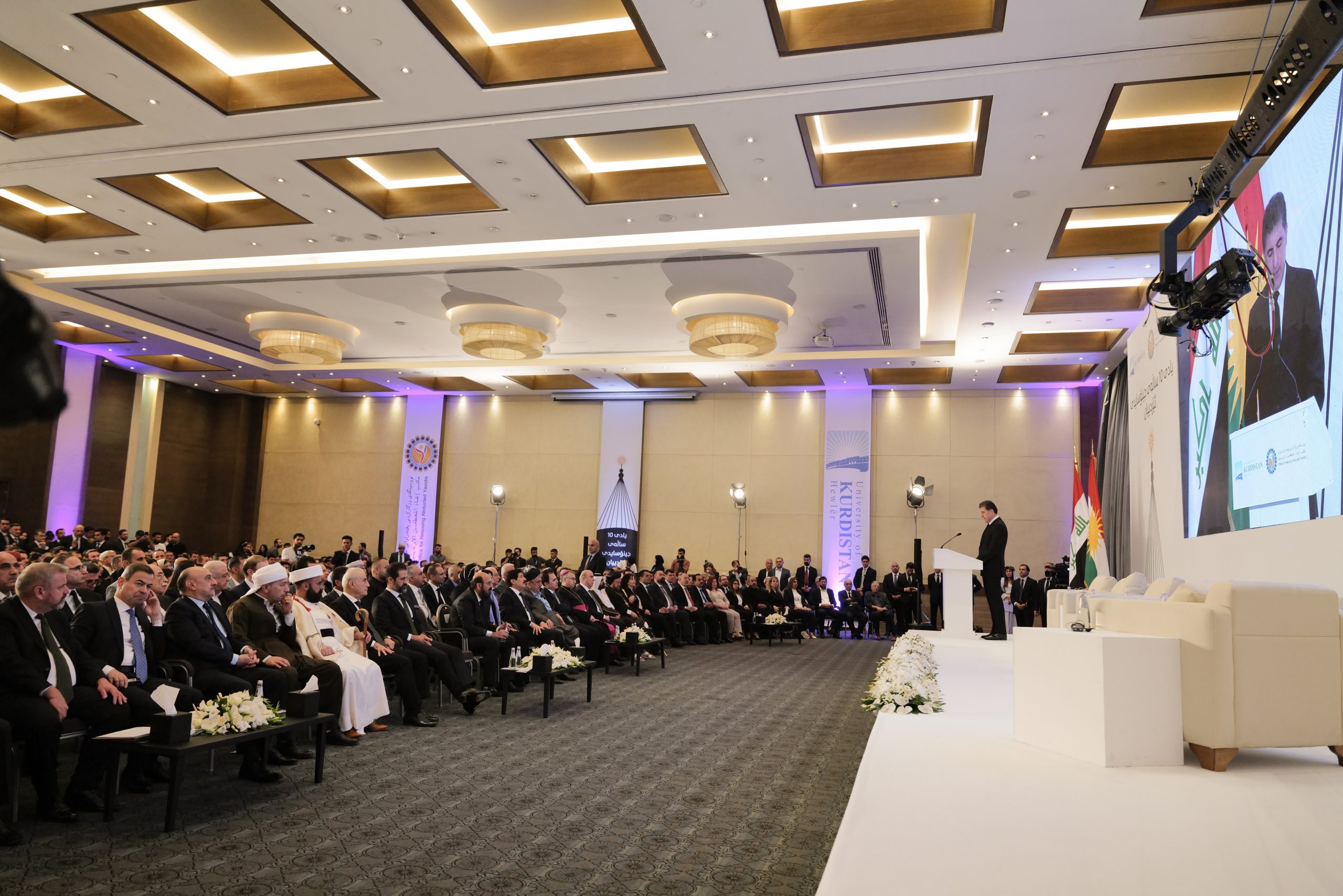
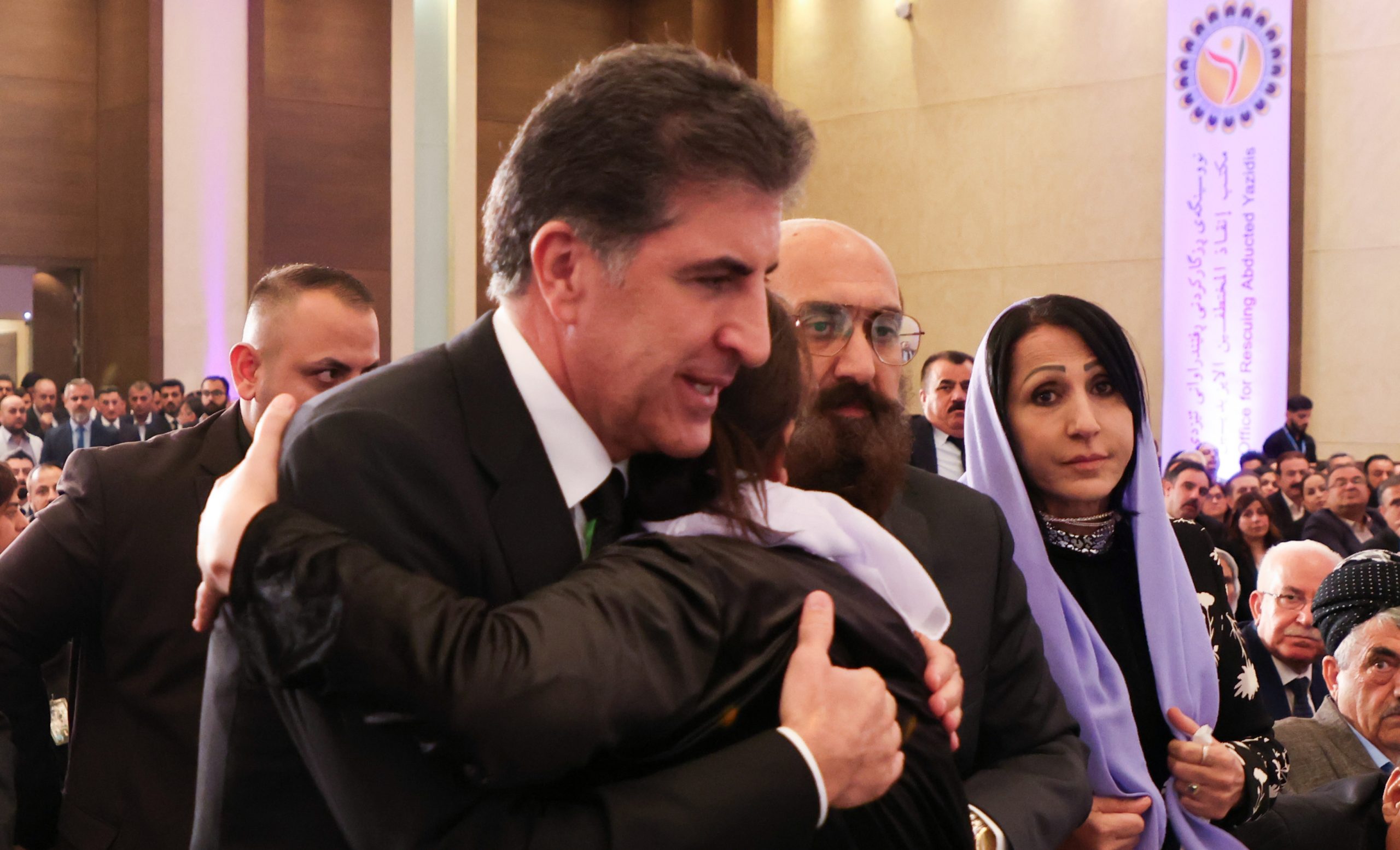
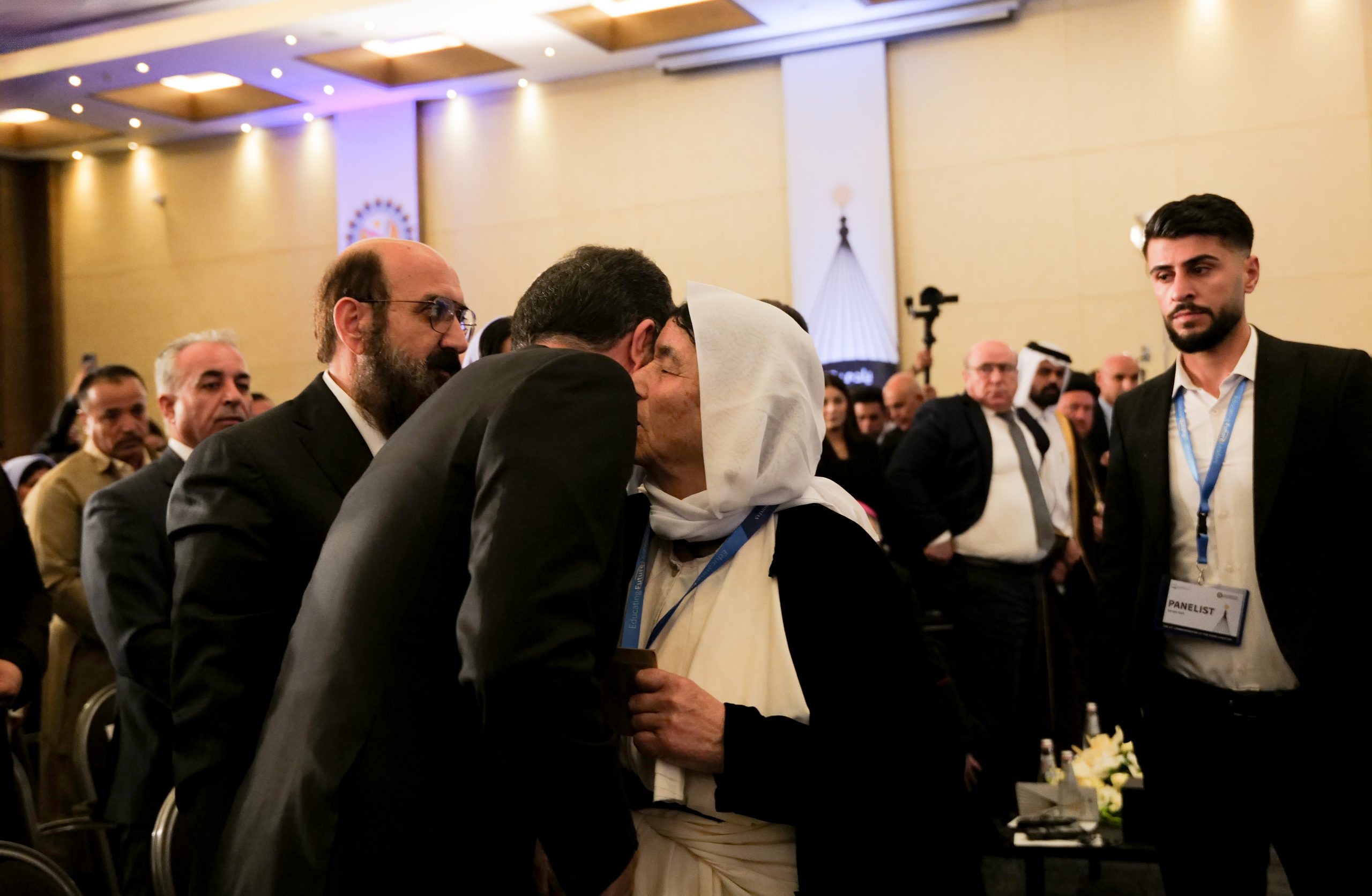
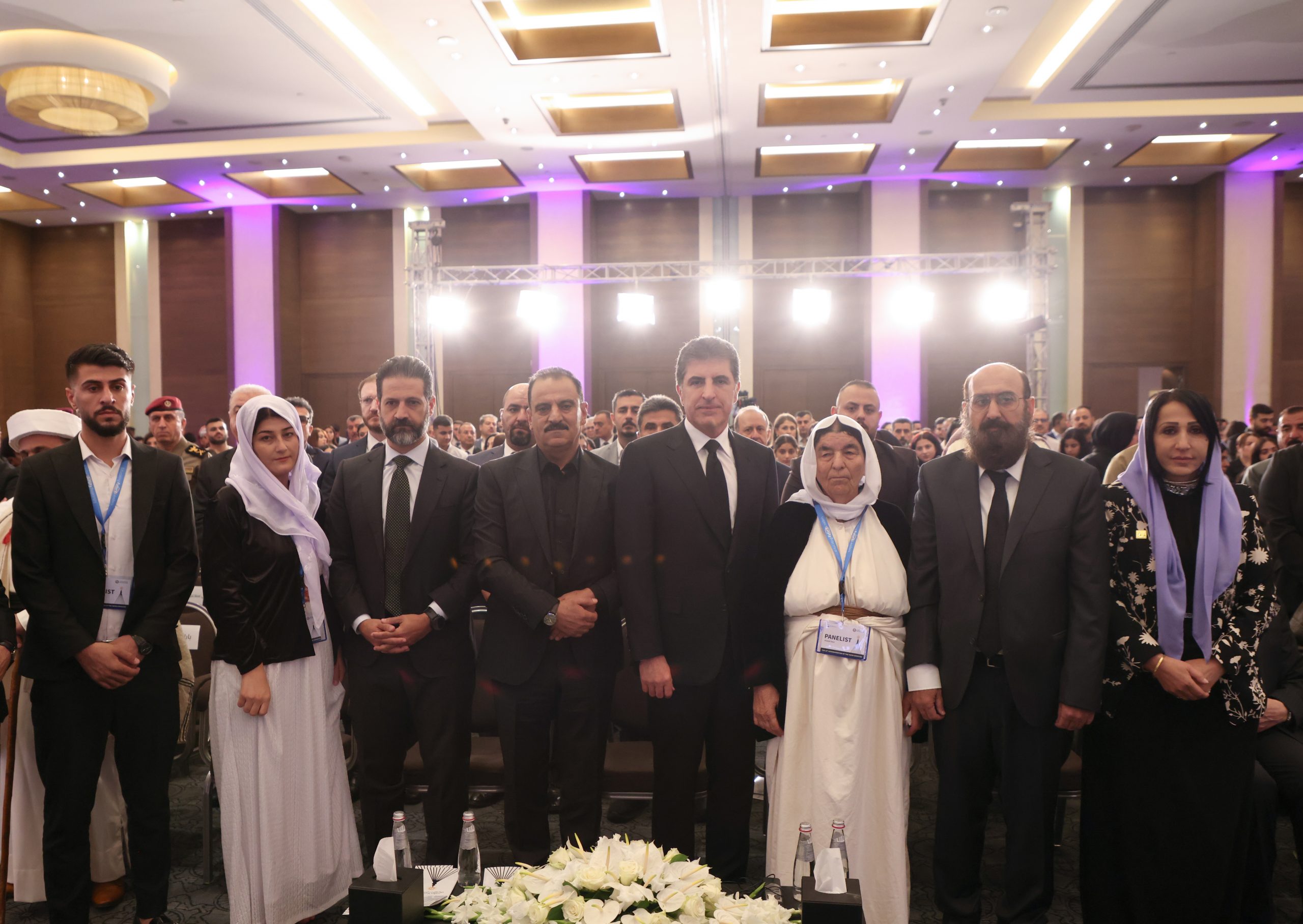
President Nechirvan Barzani participated today in the 10th Commemoration of the Yazidi Genocide which was arranged by the University of Kurdistan-Hewler and the Office for Rescuing the Abducted Yazidis in Erbil. The ceremony was attended by the representative of the Iraqi President, the representative of the Kurdistan Region Prime Minister, KRG Deputy Prime Minister Qubad Talabani, the Mir of the Yazidis, the Baba Sheikh, the Head of the Kurdistan Region Judicial Council and a number of officials from Iraq and the Kurdistan Region, along with many diplomats and Yazidi representatives.
President Nechirvan Barzani delivered the following speech at the ceremony:
Your Excellency, Mir of the Yazidis, Mir Hazim Tahseen Beg,
Your Excellency, Baba Sheikh,
Dear Yazidi brothers and sisters,
Dear Attendees,
Good morning,
The 10th anniversary of the tragic Yazidi Genocide is a solemn occasion for us to reflect on one of the most heinous atrocities in modern history. Even a decade later, the wounds remain raw, and our Yazidi community continues to endure the deep and lasting impact of this horrific event. The memory of this appalling crime stands alongside other atrocities, such as chemical attacks, the Anfal campaign, forced deportation, mass graves, and the widespread destruction inflicted upon the people and the land of Kurdistan.
Over 5,000 individuals were brutally murdered and buried in nearly 100 mass graves. More than 6,417 Yazidi females, minors, and young children were abducted and subjected to trafficking. Tragically, the whereabouts of 2,596 of these individuals remain unknown. The devastation wrought upon Sinjar and its neighbouring areas, along with the forced migration of hundreds of thousands from Sinjar and its vicinity, ensures that the immense suffering of all those affected will persist indefinitely ̶̶ not just for a decade, but for eternity.
The genocide of the Yazidis, in our time, was an unspeakable tragedy that deeply shook the very foundations of humanity across the world. This devastating event marked a pivotal juncture in the history of Kurdistan and Iraq, underscoring the urgent need for heightened vigilance and collaboration within the international community to prevent such atrocities from occurring in the future. It is imperative that all possible measures are taken to hold the perpetrators accountable, deliver justice for the victims, and provide comprehensive reparations to those affected.
On this solemn day, we honor the sacrifices made by the Yazidi community with the highest reverence. We pay tribute to their sacred spirits, who will forever hold a cherished place in the hearts of every Kurdistani and compassionate individual. Our thoughts are with the families of the fallen, and we stand in unwavering solidarity with them in their profound grief. We deeply understand their enduring yearning, their lamentation, and the sadness that echoes incessantly in their lives. Together, we share in their pain and remain steadfast by their side.
Ladies and gentlemen,
Recovering from the aftermath of genocide, rebuilding daily routines, and nurturing a renewed sense of hope within the Yazidi community amidst their complex circumstances presents a formidable challenge. However, their resilience and determination to survive ̶ reflected in the Yazidi’s historical ability to withstand multiple genocidal attempts ̶ will empower them to rise again and forge a new beginning.
International efforts to acknowledge the genocide of the Yazidis, along with global aid as well as initiatives taken in the Kurdistan Region and Iraq to support the Yazidi displaced, are commendable. These efforts include enacting legislation for Yazidi survivors and other affected communities, such as Christians, Turkmen, and Shabak, providing monthly financial assistance from both the Iraqi federal government and the Kurdistan Regional Government, and supporting Yazidi refugees in their return to Sinjar. However, it is clear that these actions alone are insufficient, and much more needs to be done to fully address the needs of the Yazidi community.
Mitigating the impact of genocide is a shared responsibility for the people of Iraq, the Kurdistan Region, and the global community. Addressing the psychological, social, human, economic, and environmental aftermath of genocide is a challenging, ongoing endeavour that requires exceptional proficiency, expertise, and a sense of urgency. There is no alternative but to persist and triumph in this undertaking.
It is imperative to uncover the fate of those who remain missing and to offer relief to their families, who continue to endure the anguish of prolonged uncertainty. I hereby assure the Yazidi community that our office will tirelessly persist in its efforts to rescue all abducted Yazidis until none remain in captivity.
A significant number of individuals require extended psychological support and specialized care to facilitate their reintegration into everyday life. The region of Sinjar and its vicinity necessitate reconstruction efforts, the provision of essential services, and the establishment of peace and stability. Consequently, it is imperative for the Iraqi Federal Government to collaborate with the Kurdistan Regional Government in executing the agreement aimed at normalizing conditions in Sinjar.
The welfare of the Sinjar population and the Yazidi community must be our foremost priority. It is imperative that we work together to ensure that the residents of Sinjar and the Yazidis are no longer subjected to the detrimental effects of political agendas and are not held captive by external regional influences. The autonomy of the Sinjar people in managing their own affairs should be restored, freeing them from the control of foreign powers.
Therefore, it is imperative for the PKK and other unauthorized entities to vacate Sinjar to facilitate the restoration of security, livelihoods, economic growth, and renewed optimism in the region. In a diverse Iraq, home to various religious and ethnic groups, functional institutions and adherence to the constitution are crucial for safeguarding the rights of all communities, both now and in the future. This commitment to constitutional governance serves as the cornerstone for peace, stability, and progress in our nation, requiring collective efforts toward its implementation.
Dear Attendees
Yazidism embodies principles of life, humanity, and mutual acceptance. It does not conflict with any other religious or belief systems. The Yazidi community values happiness and peaceful coexistence with their environment, fostering a society that prioritizes peace and stability. Their loyalty and compassion extend to their nation, fellow citizens, and neighbors. Consequently, the Yazidis serve as a vital pillar of a diverse culture characterized by pluralism, coexistence, and tolerance within both Kurdistan and Iraqi society.
By perpetrating genocide against the Yazidis, ISIS sought to sow discord, disunity, and strife among the various societal groups as well as dismantle our culture of peaceful cohabitation. Regrettably, in Sinjar and other areas, the Yazidis awoke one fateful morning to find their longtime neighbors donning black attire, aligning themselves with ISIS, and launching violent attacks against the Yazidi community. This reality is undeniably a source of profound anguish.
As we reflect on a decade marked by genocide and hardship, the Yazidi community must prioritize the restoration of trust above all else. It is incumbent upon each and every one of us to take all essential measures to provide the Yazidis with safety, reassurance, and optimism for a brighter more promising tomorrow. Together, let us devise a strategy that transforms their past experiences into a catalyst for indefinite protection, ensuring that they never have to endure such a tragic chapter again.
Our universities have a crucial role to play alongside the government, political parties, and other stakeholders in serving the Yazidis. It is imperative that academic institutions prioritize scientific research and academic theses in various languages to explore the ways in which the Yazidi community has safeguarded their religion, culture, traditions, and language.
I urge our academic institutions to allocate a portion of their graduate and postgraduate research projects to the study of the Yazidi community, encompassing all aspects of their existence. This initiative will help empower the Yazidis to share their narratives and advocate for their rights while simultaneously preserving their cultural identity and legacy, ultimately establishing a robust, factual, and credible body of knowledge in global discourse.
In conclusion, we honor the valiant Peshmergas who lost their lives during the mission to free Sinjar, guided by the leadership of President Masoud Barzani. May their souls rest in peace. Our heartfelt condolences go out to their esteemed families.
The defeat of ISIS in Iraq and the Kurdistan Region was made possible by the support of the international coalition. By working together, we can confront and dismantle the dangerous ideologies of terrorism, extremism, and violence. It is imperative that we maintain our collaborative efforts to address the ongoing threat posed by ISIS to the peace and stability of Iraq and the wider region.
I express my gratitude to the University of Kurdistan-Hawler and the Office for Rescuing Abducted Yazidis for their tireless work in coordinating this commemorative event. I would also like to extend my appreciation to the officials and staff of our office for their relentless efforts in rescuing the abducted individuals. The successful rescue and repatriation of 3,579 abductees is a remarkable achievement that deserves our deepest recognition and praise. I extend my best wishes for their continued success.
To the Yazidi community, I pledge our unwavering commitment to support and protect your rights. Our dedication to transforming Sinjar into a province and rebuilding it remains resolute. We are steadfast in our mission to uphold the political and administrative inclusion of the Yazidis and other groups within the governmental structures of both the Kurdistan Region and Iraq. Furthermore, we will persist in our efforts to raise awareness and seek reparations for the genocide inflicted upon the Yazidi people.
I extend my heartfelt regards to all those observing this sombre anniversary today, no matter where you are. I wish to express my gratitude to everyone who have supported the Yazidi community and the residents of Sinjar since the onset of the genocide. I especially acknowledge the steadfast and welcoming people of Duhok and the broader Badinan region, who embraced the victims of Sinjar with open arms. Their compassion and bravery will remain etched in our memories.
May the memory and spirit of the Iraqi Air Force General Majid Abdul Salam Al-Tamimi be blessed, as he tragically lost his life while bravely assisting the victims of Sinjar. We convey our salutations to his spirit and offer our admiration and affection to his relatives.
Once again, welcome everyone.
Thank you.























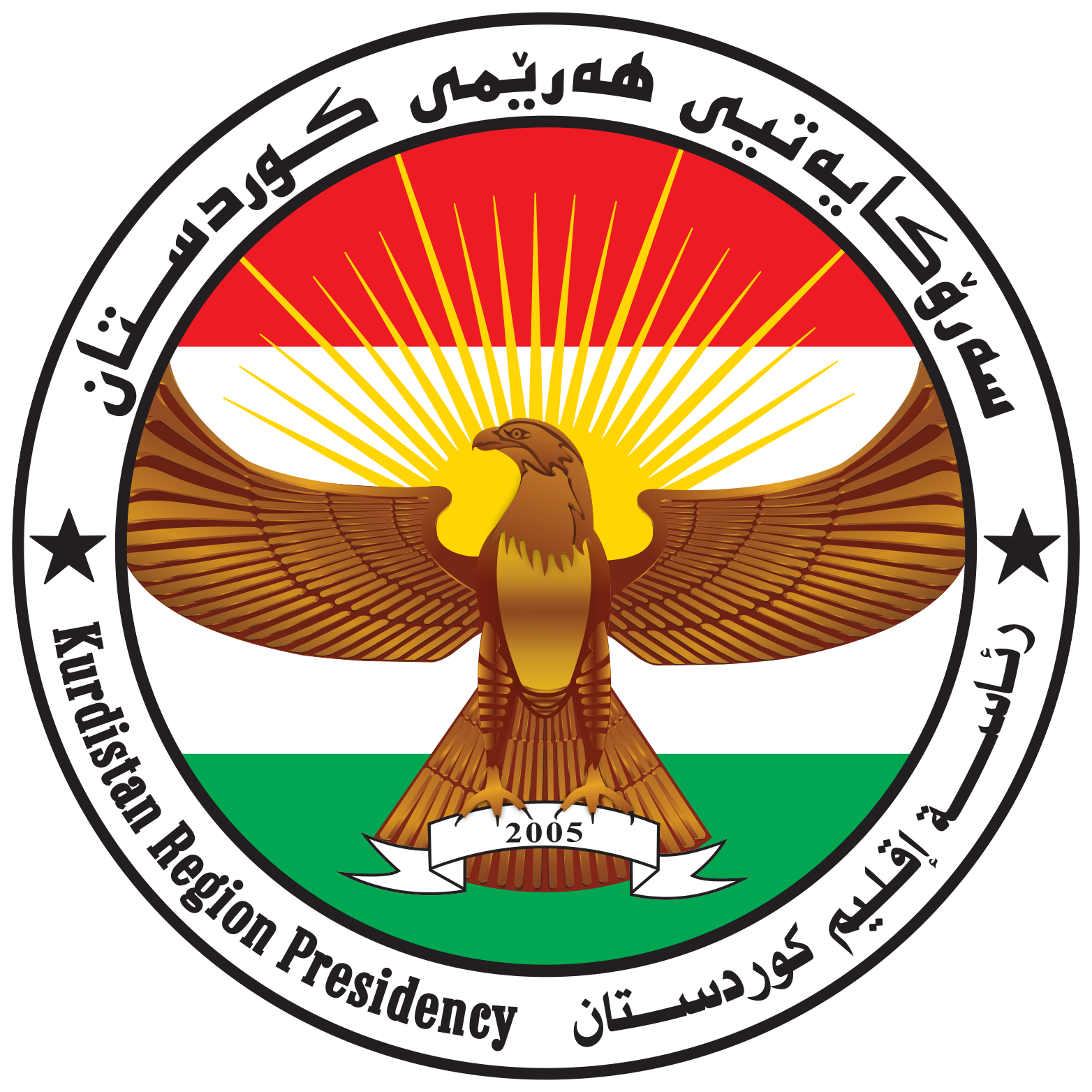

 پەرلەمانی کوردستان
پەرلەمانی کوردستان
